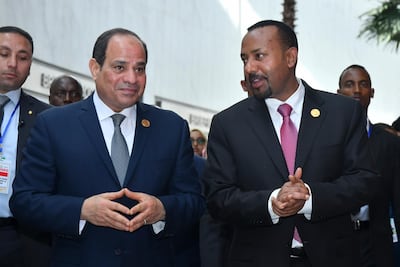Negotiations between Egypt, Sudan and Ethiopia over Addis Ababa's massive dam on the river Nile appear to have ended without a breakthrough.
Egypt said on Monday that Ethiopia's position has "not tangibly changed" after two days of talks in Cairo.
The Grand Ethiopian Renaissance Dam, or Gerd, has been the source of a dispute between Ethiopia and its northern neighbours that has lasted more than a decade.
Cairo and Khartoum insist that Addis Ababa should enter a legally binding agreement on how it will fill and operate the dam, which they fear could reduce their share of Nile water and hurt agriculture.
But Ethiopia maintains that recommendations, rather than a binding agreement, should suffice and insists that the dam and its operation are matters of national sovereignty.
It has also sought to reassure the two downstream nations that no harm would come to them from the dam, which is built on the Blue Nile close to the Sudanese border.
The Egyptian government's statement on Monday suggested the latest negotiations had failed to resolve these issues.
“The round of negotiations that has ended in Cairo did not witness a tangible change in Ethiopia's positions,” the statement said.
“Egypt will continue its efforts to reach in the nearest time possible a legally binding deal … that safeguards Egyptian interests and water security while benefiting the three nations.”
The statement did not say when negotiations might resume and there was no immediate comment from Sudan or Ethiopia on the talks.
Egypt, the Arab world's most populous Arab nation, is alarmed that the dam would reduce its share of the Nile's waters and subsequently wipe out hundreds of thousands of jobs in its vast agricultural sector, disrupting its delicate food balance at a time of rising prices and rapid population growth.
Addis Ababa has maintained that it is well within its rights to build the hydroelectric dam on the Blue Nile, which originates in Lake Tana. The tributary provides more than 85 per cent of the Nile's waters.
The latest round of negotiations, which began on Sunday, was the first in more than two years.
The renewed talks suggested a thaw in tense relations between the two countries and came after Egyptian President Abdel Fattah El Sisi met Ethiopian Prime Minister Abiy Ahmed in Cairo last month.
Egyptian public opinion over the dam has fluctuated over the years, with many in the media urging the government to take military action against Ethiopia before Mr El Sisi declared that only diplomacy would resolve the dispute.
But the absence of a deal on a crucial foreign policy issue has been a source of criticism of his government.



